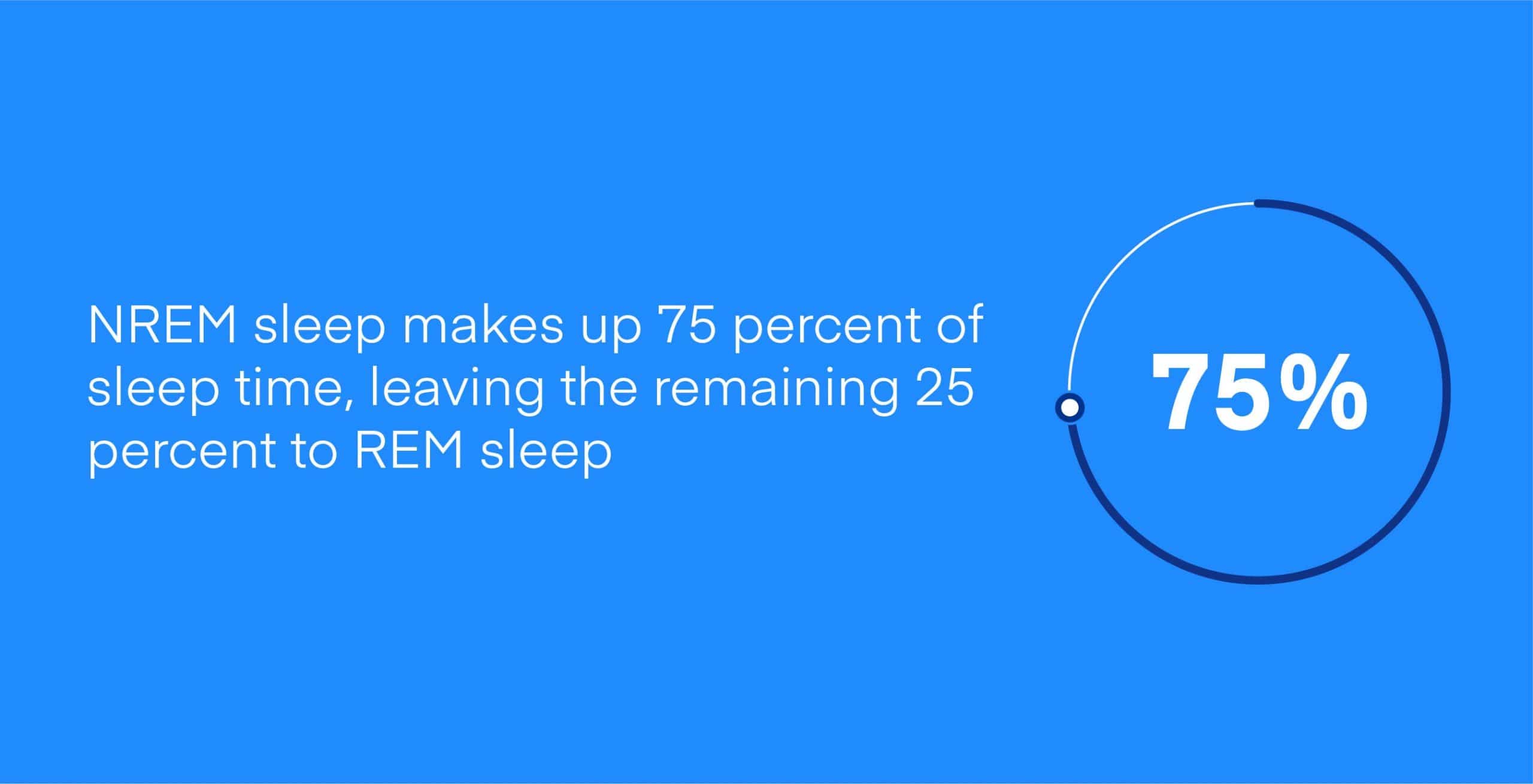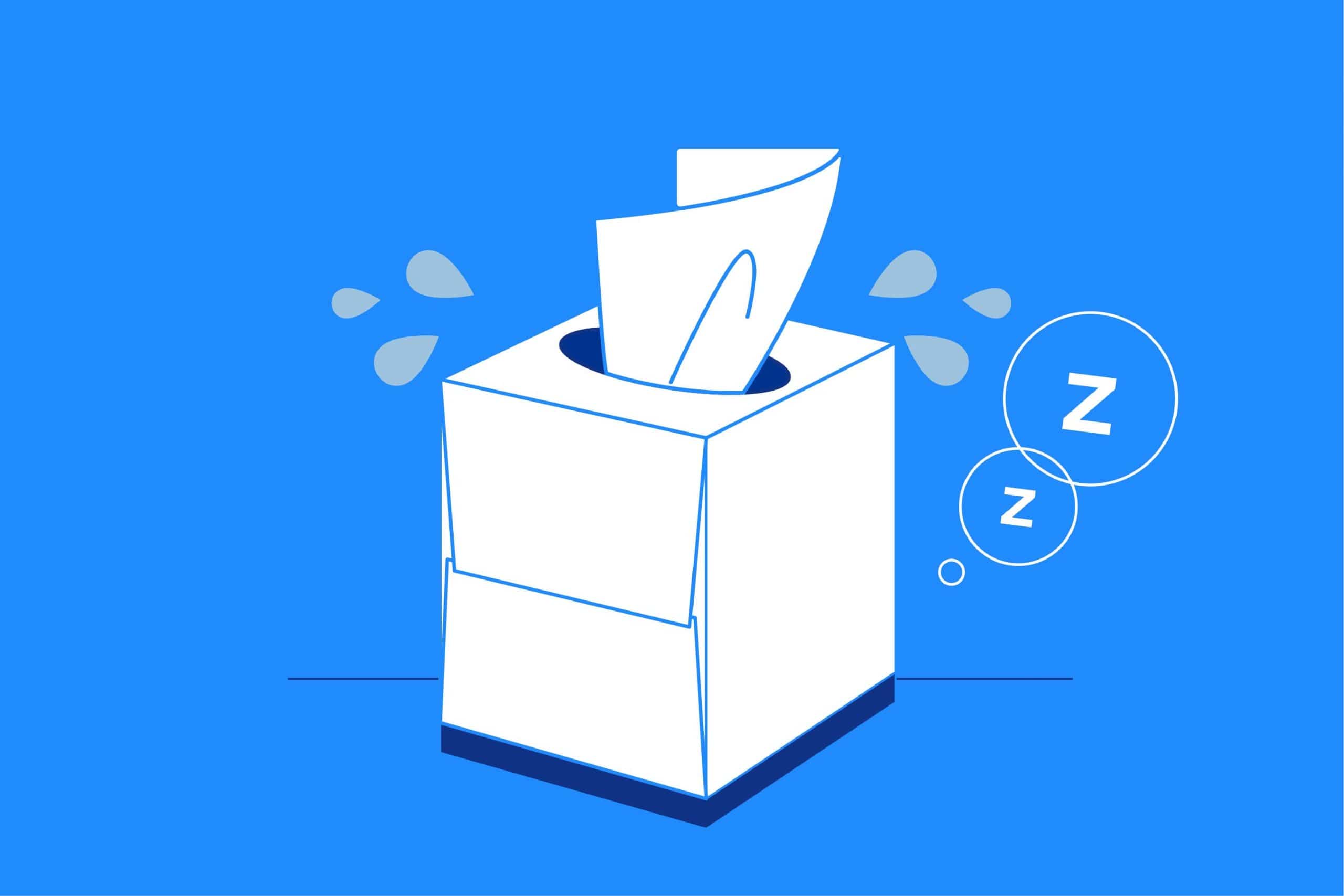Key Takeaways
- What Is Sneezing: Sneezing is an involuntary reflex that expels air from the lungs through the nose and mouth, a process of clearing irritants from the nose and throat. It is triggered by various factors, including allergens, particles in the nasal cavity, illnesses like colds and flu, and even bright lights in some individuals.
- Can I Sneeze as I Sleep: Sneezing during sleep is unlikely due to the sleep cycle. During REM (Rapid Eye Movement) sleep, the body experiences muscle atonia, where muscles are relaxed, and neurotransmitters are shut down. This prevents the triggering of a sneeze, as histamines cannot be released. While it is possible to sneeze during NREM sleep if strong stimuli are present, it typically leads to waking up to sneeze.
- Minimizing Chances of Sneezing: External stimuli entering the nasal passage during sleep are less likely, as the sleep environment remains stable. Keeping the bedroom clean and minimizing allergens can reduce the chances of sneezing reflexes during sleep, ensuring a more restful night’s sleep.
Chances of a reflex action manifesting itself during sleep seems unlikely. Sleep is a restful state of the body, and a sneeze is a reflex usually triggered by external stimulants. When you are asleep, your body is less likely to respond to outside stimuli than when you’re awake.
You’re less likely to hear a soft whisper or feel a soft tap on your hand when asleep, but a loud bang or a vigorous shake may wake you up. Similarly, a strong-enough stimulant near your nose may wake you up from sleep, triggering sneezes.
What Causes Sneezing?
Sneezing, also known as sternutation, refers to the involuntary act of expelling air from the lungs through the nose and mouth. Some of the common causes that trigger sneezing are:
- Allergens which affect you in the form of dust or pollen
- Any other tiny non-allergen particle which enters the nasal cavity
- Illnesses such as influenza, common cold, and cough
- Sometimes bright lights can be the trigger to sneezes. 'Photic sneeze reflex' Verified Source National Library of Medicine (NIH) World’s largest medical library, making biomedical data and information more accessible. View source is a condition affecting one out of four individuals. In this condition, bright lights like the sun’s rays may cause sneezes or prickle your nose.
- In a rare genetic disorder known as “stomach sneeze reflex,” or “snatiation,” the process of food digestion may sometimes trigger sneezes. “Snatiation” is a combination of the words “sneeze” and “satiation.” The feeling of satiation leading to sneezes is termed as “snatiation.” In this condition, a full and stretched stomach makes you sneeze, but the reason behind it is unclear.
See also Flu Season and Sleep.
How Do We Sneeze?
Sneezing is usually a process of clearing out irritants from your nose and throat. It is a reflex mechanism of the body which occurs when you detect allergens or non-allergen particles in your nasal cavity. Your nose hair serves as the first line of defense to these particles.
Despite their presence, some of these foreign bodies may still make their way through to the mucous membranes in the nasal passage—triggering the release of a neurotransmitter called histamines. These histamines are organic compounds, primarily made up of nitrogen particles, which irritate nerve endings in the nasal mucous membranes causing them to swell.
This process sends signals to the brain, which in turn responds by signaling the pharyngeal and tracheal muscles to create large openings in the nose and throat leading to a sneeze.
Does Sleep Prevent Sneezing?
When you lie on your sides, back, or stomach, your mucous membranes swell—one of the conditions that trigger a sneeze. But sleep researchers and neuroscientists are of the opinion that sneezing isn’t possible during sleep.
Nighttime sleep usually comprises four to six sleep cycles and each sleep cycle has 4 stages—including three stages of Non-Rapid Eye Movement (NREM) and one Rapid Eye Movement (REM). NREM sleep makes up 75 percent of sleep time, leaving the remaining 25 percent to REM sleep.
- Stage 1: This is a stage of light sleeping, in which you can be easily disturbed. Your eyes move slowly and your muscles start to relax and sometimes contract.
- Stage 2: In this stage, your eye movement stops—your body temperature and heart rate drop as your body prepares for deep sleep. Brain waves also start slowing during this stage.
- Stage 3: Blood pressure drops during this stage and the slow-moving brain waves, known as delta waves, are interspersed with rapid brain waves, initiating the process of deep sleep. Waking up at this stage makes you feel disoriented.
- REM sleep: In this stage, the eyelids remain closed, but the eyeballs move frequently from side to side. The brain waves mimic responses of waking activities, or dreams—while your body sleeps, your brain is awake. Most dreams take place during this stage. You tend to remember your dreams because your brain is awake. But your body is asleep during this stage leading to REM atonia, preventing sneezing.
The word atonia refers to a medical condition in which the muscle loses all its strength. In REM atonia, your body is asleep, your muscles are relaxed, and only your brain is awake. Even the neurotransmitters are shut down during this stage, so even if an allergen or particle enters your nasal cavity and reaches the mucous membranes, it doesn’t trigger the neurotransmitter histamine. Lack of histamines makes it impossible to trigger a sneeze during REM sleep.
During NREM sleep there is no atonia—technically, a sneeze may be triggered during this time. But the brain’s cerebral cortex and thalamus region keep activating each other during this stage to suppress sensory reactions such as sneezing. Like you don’t usually feel hungry, thirsty, or the urge to relieve yourself during sleep, similarly you don’t feel the urge to sneeze. But strong stimuli may sometimes wake you up during the NREM stage, leading to a sneeze.
The chances of strong external stimuli suddenly entering your nasal passage is less during sleep, because your environment doesn’t change while you are sleeping. When you are sick you may tend to sneeze during NREM sleep, but in those instances, you wake up to sneeze.

FAQs
How can I check sneeze reflexes during sleep?
Sneeze reflex refers to the strong urge to sneeze which may wake you up during NREM sleep. You can check these urges by keeping your bedroom clean and vacuuming often. Never keep clothes on your bed and regularly wash your bedding and pillows, especially during allergy season.
All this prevents allergens, pollens, dust mites, and other sneeze-triggering particles from accumulating in your bedroom, reducing the chances of foreign particles entering your nasal cavity.
Does your heart stop when you sneeze?
The electrical activity in your heart does not stop during a sneeze. However, during a sneeze, the intrathoracic pressure in your body increases, resulting in a decrease of blood flow to the heart. Your heart compensates for this increase of blood flow by adjusting its beat, but the beat does not completely stop.
Can you cough or sneeze in your sleep?
You cannot cough or sneeze in deep or REM sleep; however, you can do so in light sleep. In order to cough or sneeze, your body must enter a state of wakefulness, even if it’s so brief you don’t remember it. Persistently coughing or sneezing during sleep can lead to daytime fatigue as it prevents deeper, more restorative rest from taking place.
Conclusion
Sneezing during sleep does not seem possible, but sometimes a strong urge may wake you up from NREM sleep and make you sneeze. You may fall asleep quickly after sneezing, but waking up to sneeze in between sleep may diminish the quality of your sleep. It is best to keep your bedroom environment clean, minimizing the chances of sneeze reflex.
About the author
April Mayer is a sleep expert and writer with a degree in exercise physiology. She has dedicated her career to exploring the relationship between sleep and productivity. Her insightful articles, such as "The Surprising Way Your Mood Might Be Messing With Your Productivity" and "Wake Up to More Productive Mornings," have been featured in reputable publications like Forbes, Greatist, Real Homes, Thrillist, Tom's Guide, and Eat This, Not That. With a passion for helping others lead more productive lives through restful sleep, April offers valuable expertise on foods and vitamins for better sleep. As a trusted member of the Early Bird team since March 2020, she continues to provide informative and well-researched content.
View all posts




